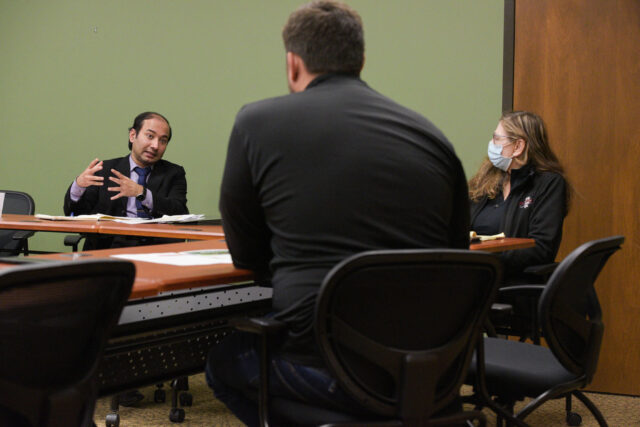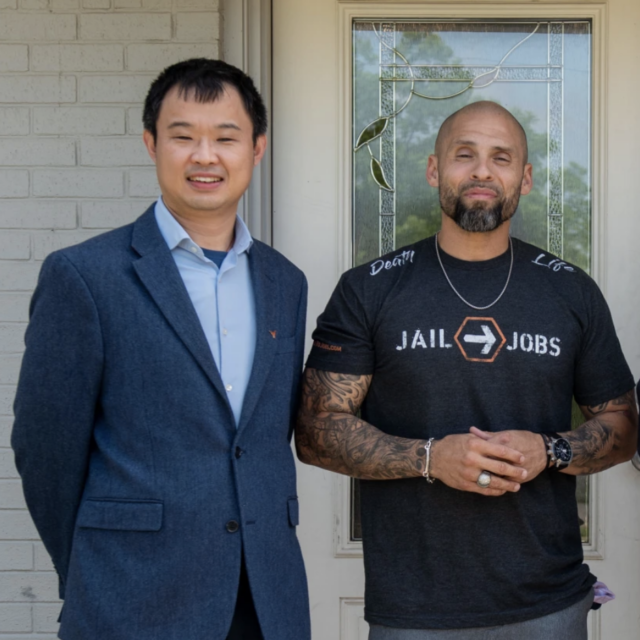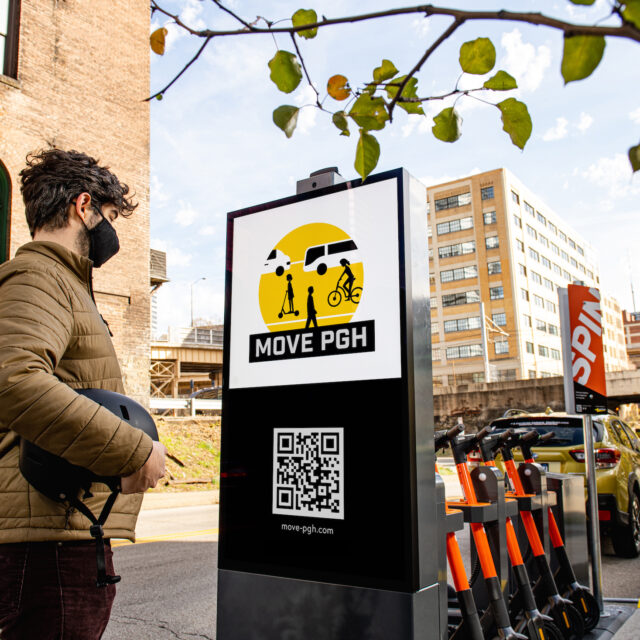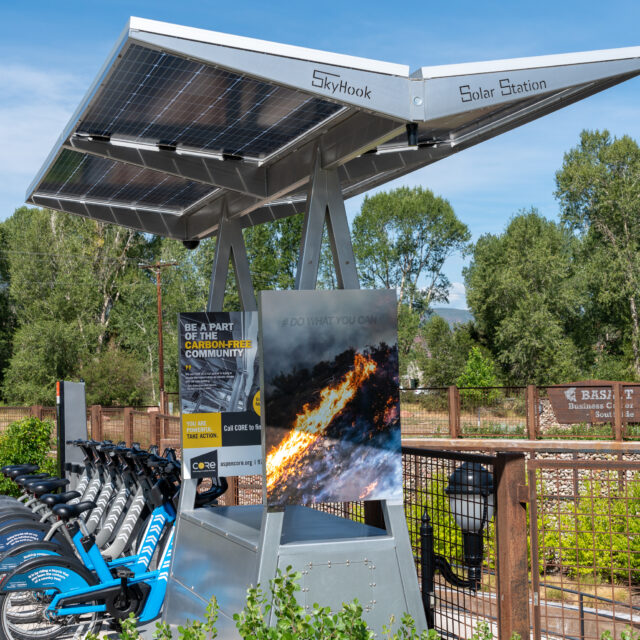Researchers in Arkansas Are Redesigning Bike Share
by Kiran Herbert, Communications Manager
January 19, 2022
In cooperation with city officials and community-based organizations, Fort Smith academics are creating a bike share system that serves low-income residents and establishes best practices for equity.

Professor Suman Mitra discusses a shared micromobility pilot project set to launch in Fort Smith, Arkansas. (Photo credit: NWA Democrat-Gazette/Hank Layton)
In Fort Smith, Arkansas, like many medium-sized cities across the country, getting around without a car can be a somewhat cumbersome process — especially if you’re a low-income worker whose hours don’t coincide with public transportation. Residents used to be served by a bike share system — a partnership between the city and Zagster — but once the pandemic hit, Zagster went out of business. Although that system lasted less than six months and it only served downtown and the riverfront area, it was well-received and people used it.
In the months following, the City of Fort Smith considered what a new system might look like but no concrete plans materialized. In January 2021, researchers at the University of Arkansas applied and were selected for a National Science Foundation (NSF) research grant in order to study what a new, more equitable system might look like. Focusing on high-priority neighborhoods, researchers used the $50,000 to fund an extensive community engagement process that included workshops, surveys, and a series of virtual development sessions, as well as to gather data on existing transportation needs and barriers.
“My work is focused on how new technology — shared scooters or bicycles, all these new things — how it can improve the quality of life of disadvantaged populations,” says Suman Mitra, assistant professor of civil engineering at the University of Arkansas and principal investigator of the grant. “By disadvantaged populations, I meant people who do not have a car, low-income population, some older adults, or any other minority group.”
The resulting study, “SMILIES: A Community-Based Framework to Develop Shared Micromobility for Affordable-Accessible Housing,” was selected for an additional $1 million NSF grant in September 2021. With the funding, a team co-led by Mitra will work with community-based partners, the city, and local businesses to design and deploy bike share to high-priority neighborhoods throughout Forth Smith. The year-long pilot will estimate the impact of shared micromobility services on household travel and costs, job access, and more, as well as inform a set of best practices to guide local governments and systems elsewhere.
As shared micromobility has increased in the last few years, many small and medium-sized cities have had a hard time attracting some of the larger operators that proliferate in major urban areas. Reasons differ depending on the place, but operators often cite a lack of demand, inadequate infrastructure, and/or a lack of density. Mitra’s work is driven by a desire to help small cities create shared micromobility systems that are community-driven and economically sustainable. And since low-income groups are so often left out of transportation innovations and the design process, his work positions them at its center.
“We wanted to design something for the low-income community in a small-sized city based on the feedback we got from them,” says Mitra. “Generally, as researchers, we tell the community ‘this is a good thing because my research is saying that.’ In this study, we are giving people options and letting them tell us what they think will work best.”
Although the pilot system is still in its design phase, the hope is to have it off the ground by the end of February. It will include eight stations, three in different low-income neighborhoods, two on the employee-side at places where many low-income people work, two at bus stations that serve as major transit hubs, and one in an affluent neighborhood. The specific sites were chosen using publicly-available Longitudinal Employer-Household Dynamics data, as well as qualitative data gathered during the community engagement process. Tandem Mobility will be contracted to provide the 40 bikes (primarily electric-assist) and software, as well as track ride data. Mitra also hopes to be able to offer a few adaptive bikes.
Different bike share models will be tested at different stations — for example, one area will be completely free, whereas another will charge a fee based on community feedback, and the affluent area will have the highest price. Based on quantitative data (system-level data from the bikes themselves, questionnaires) as well as qualitative data (pre and post-system neighborhood surveys, focus group discussions), the research team will put forth a set of recommendations to the city. The ultimate goal is for the city of Fort Smith to continue operating the system on its own.
To be successful in the long run, Mitra believes the city will need to somewhat subsidize the system and solicit private investment from local businesses. “There’s a huge labor shortage now, especially among low-income workers,” says Mitra, noting that an onsite bike share station might be incentive enough for folks to choose one employer over another. “We want to target more employers, more stakeholders, so they can see the benefits of this program and provide some funding to the city.”
Carl Geffken, Fort Smith city administrator, has said that if the project works, the city could partner with local investors or companies to continue operating it. He added that a bike share system would be a helpful extension to the city’s transit system. According to Reese Brewer, director of the Frontier Metropolitan Planning Organization and co-principal investigator of the project, the project is focused in north Fort Smith due to the large percentage of households with annual incomes of less than $40,000, as well as the presence of late-shift worker employment centers and public transportation. Says Brewer, “It seemed to make sense to try to integrate all of those different concepts and ideas together.”
In order to ensure that the project’s low-income target demographic knows about the new bike share stations, researchers are developing a Community-Based Participatory Action Research Team. The team will include someone from the city, at least one person from relevant neighborhoods, and someone from the research side. “Say you have seven things you want to do — the final decision will always be made by this team,” says Mitra. “So it’s important to have leaders who actually live in the community that will be using the system.”
Plans are also in the works to host educational programming and workshops centered around teaching people how to use the bikes and bike safely. Considering the lack of protected bike infrastructure in Fort Smith, Mitra says it will also be important to educate drivers regarding how to share the road and be respectful of people on bikes. Some of the project’s community partners include the Western Arkansas Planning and Development District, local bike-rental company Riverside Rides, bicycle shop Champion Cycling, the Future School of Fort Smith and the Arkansas Colleges of Health Education, whose students will engage in a grassroots campaign to help spread the word about bike share at churches, community centers, and government offices.
When asked how he’ll know whether or not the project was successful, Mitra says the research team has specific targets regarding ridership and employer investment. The team hopes to create something sustainable that benefits the Fort Smith community, as well as make a scientific contribution towards creating more equitable shared micromobility systems. Says Mitra, “If we get good community feedback, and people in our target communities are using the system and it’s helping them, that will be a success.”
The Better Bike Share Partnership is funded by The JPB Foundation as a collaboration between the City of Philadelphia, the National Association of City Transportation Officials (NACTO) and the PeopleForBikes Foundation to build equitable and replicable bike share systems. Follow us on Facebook, Twitter and Instagram or sign up for our weekly newsletter. Got a question or a story idea? Email kiran@peopleforbikes.org.



